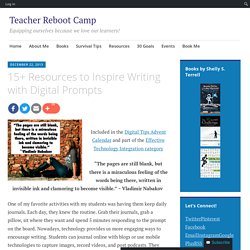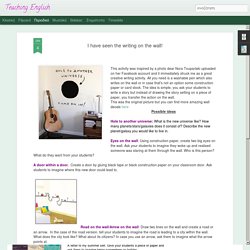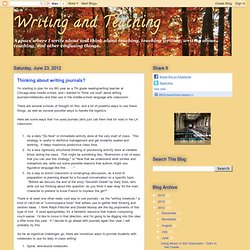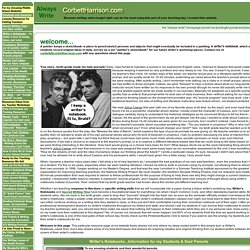

Gif Lingua. 15+ Resources to Inspire Writing with Digital Prompts. Included in the Digital Tips Advent Calendar and part of the Effective Technology Integration category “The pages are still blank, but there is a miraculous feeling of the words being there, written in invisible ink and clamoring to become visible.” ~ Vladimir Nabakov One of my favorite activities with my students was having them keep daily journals.

Each day, they knew the routine. Grab their journals, grab a pillow, sit where they want and spend 5 minutes responding to the prompt on the board. Nowadays, technology provides us more engaging ways to encourage writing. Vary the types of writing students do! Challenge: Default Title. FREE Printables from MakeBeliefsComix.com! Teaching English: I have seen the writing on the wall! This activity was inspired by a photo dear Nora Touparlaki uploaded on her Facebook account and it immediately struck me as a great creative writing activity.

All you need is a washable pen which also writes on the wall or in case that's not an option some construction paper or card stock. The idea is simple, you ask your students to write a story but instead of drawing the story setting on a piece of paper, you transfer the action on the wall. This was the original picture but you can find more amazing wall decals here Possible ideas Hole to another universe: What is the new universe like? A door within a door. Road on the wall/Arrow on the wall: Draw two lines on the wall and create a road or an arrow. Hello, how are you? Visual Storytelling Prompts: 3D Gallery. Visual Writing Prompts on Pinterest. (38) ✏️Quick write - picture prompts on Pinterest.
Www.teachingideas.co.uk/english/files/wi_2whereamigoing.pdf. (38) Write About on Pinterest. CornDogArt with Denise M. Cassano. Writing prompts. Literary jukebox. Thinking about writing journals? I'm starting to plan for my 6th year as a 7th grade reading/writing teacher at Chicago-area middle school, and I wanted to "think out loud" about writing journals/notebooks and their use in the middle-school language arts classroom.

There are several schools of thought on this, and a lot of powerful ways to use these things, as well as several possible ways to handle the logistics. Here are some ways that I've used journals (let's just call them that for now) in the LA classroom: As a daily "Do Now" or immediate activity done at the very start of class. This strategy is useful to reinforce management and get students seated and working. It helps maximize productive class time. There is at least one other really cool way to use journals - as the "writing notebook," a kind of catch-all or "commonplace book" that writers use to gather their thinking and random ideas.
All of these cost money, and every year except one, I have provided these notebooks to my students. Prompts and Resources for Daily Journal Writing. Plinky. Journal Jar - Free Journal Topic App for iPhone / iPod touch / iPad / Android. I Keep a Writer's Notebook alongside my Students. Do you? I began requiring journal writing way back in 1990--my first year of teaching.

I had taken a methods class at my university that stressed the importance of having students keep journals to record daily responses to topics. I said, "Why not? " and every student from day one maintained a spiral-bound "journal" for me. Most students tossed their journals in the trash on the last day of class in June; they could have cared less about the responses they'd scribbled in there, and I knew they didn't care about their journals, yet I continued to use this daily practice for those first five or so years of teaching. To be perfectly honest, journal-writing was ten or fifteen minutes of daily "busy work" that allowed me to take care of attendance and set up the classroom's lesson for the day while the kids were quiet.
In the spring of 1998, thanks to my high school journalism students' hard work, I was awarded with a month-long, summer fellowship from I have to be doing something right.